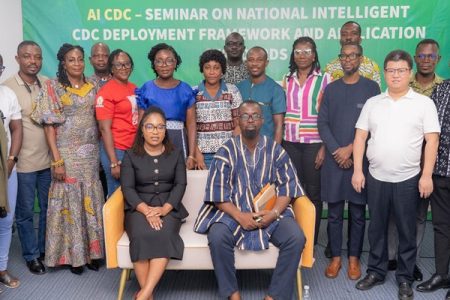By PRINCE DOGBEY, Accra
In a decisive move to modernize disease surveillance and strengthen emergency response systems, the Health Community of West Africa (HCOWA) Association, in collaboration with the Ghana Health Service and other key institutions, has initiated discussions to deploy Artificial Intelligence (AI) as a national and regional health strategy tool.
The event, held in Accra under the theme “Transforming Public Health with AI: National Frameworks for Smarter Disease Control and Emergency Response,” brought together stakeholders from across the health, research, and pharmaceutical sectors to chart a path toward AI-powered public health infrastructure.
According to experts at the seminar, the initiative aims to shift Ghana and the sub-region from reactive to proactive disease management.
They noted that the COVID-19 pandemic exposed the limitations of traditional surveillance systems and underscored the urgency to integrate smart technologies that can anticipate and contain outbreaks.
It was emphasized that AI can assist in forecasting and preventing diseases such as malaria and cholera by analyzing environmental, health, and sanitation data in real-time.
For example, patterns in rainfall and mosquito density can be used to predict malaria hotspots, while water quality monitoring and movement tracking can help detect early signs of cholera outbreaks—enabling timely interventions before crises escalate.
Speaking on behalf of the Association, Prince Opoku Dogbey, Deputy President of HCOWA, introduced a proposed AI-Powered National Disease Control Framework that aims to integrate all levels of public health data into a unified, responsive system.
According to Prince Dogbey, the new model will feature a Centralized Lab Server for seamless data sharing between healthcare facilities, Community-Grade Centers to decentralize diagnostic services, a robust Big Data Integration mechanism for predictive analytics, and a Giant Screen Data Visualization System to give national decision-makers real-time access to outbreak metrics.
“This system ensures that no health emergency takes us by surprise again. HCOWA is committed to supporting Ghana and the West African region in establishing strong, AI-backed infrastructure for faster detection and response,” he said.
Mr. Mahama Seidu, Deputy Director for Research and Health Policy at the Ghana Health Service, outlined five pillars that research and health institutions must adopt to effectively integrate AI into public health operations. These included the development of health-specific AI tools, rigorous testing and validation, strong ethical safeguards, policy advocacy, and multi-sector collaboration.
AI surveillance must balance efficacy with equity; transparent and ethical frameworks are critical for public trust and long-term sustainability,” Mr. Seidu stated.
Throughout the seminar, HCOWA Association reiterated its commitment to driving digital transformation in West Africa’s healthcare systems.
Renowned pharmacist and entrepreneur, Dr. Emmanuel Kwaku Ireland, Founder and CEO of Makland Group International and National Chairman of the Community Practice Pharmacists Association (CPPA), delivered a compelling address on the role of technology in modern public health.
Speaking on the topic “Harnessing AI to Revolutionize Community Health and Pharmacy Practice in Disease Surveillance and Control,” Dr. Ireland highlighted the vast potential of artificial intelligence to transform Ghana’s public health landscape.
He explained how AI could be used to streamline drug inventory systems, personalize healthcare delivery, and strengthen disease detection frameworks—particularly in rural and underserved areas.
According to him, “AI can optimize disease forecasting, bridge access gaps in healthcare delivery, and significantly improve rural health outcomes. Beyond health, it can also support agriculture, logistics, and job creation.”
Dr. Ireland further emphasized the need for multi-sectoral collaboration, urging both government and private institutions to rally behind the Health Community of West Africa (HCOWA) Association in its mission to integrate AI into disease control systems. He called for “optimum support” for HCOWA, noting that its success in deploying AI-powered health infrastructure would have far-reaching impact on Ghana’s health resilience and regional leadership in medical innovation
The seminar also featured a panel discussion where health and technology experts deliberated on the role of AI in transforming Africa’s public health future. Representatives from Korle Bu Teaching Hospital, research institutions, and private sector players contributed practical insights into how AI applications are already being implemented in diagnostics and patient care globally.
Dr. Bernard A. Logonia, Data Manager at the Noguchi Memorial Institute for Medical Research, stressed the importance of real-time disease tracking powered by AI. He explained that advanced data modeling can help identify clusters of infections and viral mutations early, which is crucial for epidemic preparedness.
“Through AI and big data analytics, we can detect viral shifts and transmission trends long before they become public health emergencies,” he said. “We must equip our systems to respond swiftly, and that starts with integrated technology and reliable data.”
The HCOWA Association, which has been at the forefront of healthcare advocacy and digital health initiatives in the region, concluded the seminar by reaffirming its readiness to work with government agencies, research bodies, and international partners to implement the proposed framework.
With the roadmap now in development, the Association believes that Ghana and its West African neighbors stand at the threshold of a new era, where AI becomes not just a tool, but a strategic partner in saving lives and securing public health resilience.
HCOWA unveils AI strategy for disease control in West Africa

Latest posts by Newscenta (see all)
